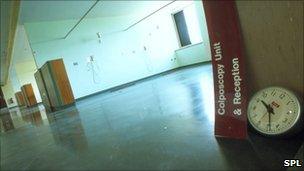'We don't need so many hospitals'
- Published
- comments

Closing hospitals 'can be for the best'
In this week's 'Scrubbing Up', Dr Greg Parston of the Public Management Foundation, argues that closing hospitals or reducing what they do can be in the best interests of an effective and efficient health service.
The coalition government's reforms to the NHS are attracting heat.
Some experts, including the respected King's Fund, provide evidence that claims of poor health outcomes as a justification for change are factually wrong. Opponents warn that the reforms will fuel privatisation, cost jobs and harm patients.
And others wonder about the timing, with the Health Select Committee expressing reservations about the viability of radical change at a time of unprecedented efficiency savings.
The reforms are huge and the opposition is vocal, but these arguments are about the wrong things.
The NHS does need change, but not these changes.
That glaring point is being ignored by government and by much of opposition, to the danger not only of the NHS but also to the health of the nation.
The government reforms will alter only the NHS's superstructure -patterns of money flow, responsibilities for service procurement and levels of accountability.
They ignore the country's health imperatives and undermine our ability to improve the NHS where it really needs to be improved.
Status quo
The real need for change is to the NHS's infrastructure - to the provision of care.
The NHS needs to radically realign service configuration to effect massive investments in non-acute care.
It needs to close unneeded hospitals and transfer resources out of expensive inappropriate facilities in order to meet the rapidly changing patterns of need.
Neither the reforms nor the status quo will achieve that.
Of course we need hospitals, but not nearly as many as we have currently.
Some experts estimate that as much as 60% of the NHS clinical budget over the next 10 years will be spent on the chronic conditions of older people, who can be cared for in facilities other than hospitals - care facilities, hostels, and even in their own homes.
They suggest that in London alone we could close a half dozen hospitals, which would easily fund high quality "close-to-home" services that allow for greater independence and self-respect.
Currently, we do not have enough low-level chronic facilities or home care professionals because today's NHS is so dominated by acute hospital and medical professionals.
Some primary care trusts were beginning to come to grips with this, exercising commissioning decisions (of considerable volume and money) in a manner that sought to change patterns of care.
In Torbay, for example, partly influenced by US Kaiser Permanente's "Home is the Hub" strategy, the integration of health and social care is driven by a powerful combination of NHS and local authority commissioners.
The results include dramatically decreased hospital admissions for the elderly and a 30% reduction in occupied hospital beds since 1999.
Dilution of power
But this is not just about the elderly.

More care could be provided in the home
While average lengths of stay for acute condition in the UK hover at seven days, in systems as diverse as the US, Sweden, France and Australia, the same figure is well below six days.
With over 1,000,000 admissions per month, even half a day adds up to a lot of money that could be spent on alternative, cheaper and more appropriate services.
We simply keep on using hospitals instead of more appropriate alternatives.
By ignoring these facts, the current reforms undermine the possibility of needed service transformation and entrench power in existing institutions.
By diluting the power of commissioning amongst hundreds of GP groups, with little experience in commissioning or inclination to real service revolution, the reforms protect many un-needed hospitals.
The effects of hundreds of individual service procurements will not re-shape the NHS. Only large-scale commissioning decisions are capable of doing that.
Commissioning health care is not simply about procuring services locally, as the reforms' advocates will have us believe; it is also about managing and reshaping the overall provision of care.
In this regard, perversely, the coalition's reforms only protect the status quo.